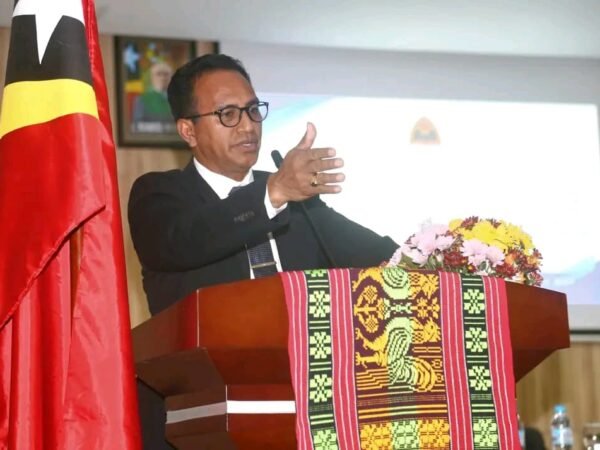Dili, April 14, 2025 (Média Democracia) – The government, through the Ministry of Justice, has made amendments to the Judicial Organization Law to allow Second Class Judges who have served for 20 years to be eligible for the position of President of the Court of Appeal.
The Minister of Justice, Sergio da Costa, explained that the previous law stipulated that only the President of the Republic could appoint judges to the Supreme Court of Justice. However, the President of the Court of Appeal, which belongs to the second instance, is appointed through an election among the Counsellor Judges, and one of them is chosen as President of the Court of Appeal.
“Therefore, we need to make this amendment, and at the same time, we are thinking of creating more opportunities, as we have justified in the government’s reasoning note, to open the space for judges, especially if there are no candidates from the First Class, then Second Class Judges could also be eligible to assume the position of President of the Court of Appeal,” said Sergio, speaking to journalists after the swearing-in ceremony of Property Agent Officials at the Ministry of Justice building last Thursday (April 11).
He added that the amendment to the Judicial Organization Law is not driven by political intentions, but rather aims to ensure that judges who have served at least 20 years and have sufficient experience can compete or be appointed as President of the Court of Appeal.
He further clarified that according to the Constitution, the President of the Republic is responsible for appointing both the President of the Court of Appeal and the President of the Supreme Court of Justice.
“This point as the objective for you to understand clearly that this law also creates a selection commission for the appointment process, although so far the process has not been fully carried out. Since 2021, there has been a 24-month deadline to prepare the structure, and another law, number 25/2022, grants an additional 30 months to work out how to establish the Supreme Court,” he explained.
The Minister noted that the number of judges is still limited around 30 people, so when the Supreme Court is established, there will still be a shortage of human resources, particularly for the Supreme Court.
He also explained that the Judicial Organization Law has already been submitted to the National Parliament because the applicable law needs to be adjusted in order to regulate the appointment process for the President of the Court of Appeal.
The IX Constitutional Government, through the Ministry of Justice, has begun making adjustments since Timor-Leste has not yet established its Supreme Court. Until that time, the President of the Court of Appeal will continue to exercise the functions of the President of the Supreme Court until 2028-2029, when the government will assess the possibility of establishing the Supreme Court.
He stressed that the articles subject to amendment include Articles 77 and 76, among others, from the Judicial Organization Law.
“In this process, we will revoke some provisions and amend others, especially in Law No. 21/2021 and also Law No. 22/2021, which concerns the fiscal organic and administrative structure,” he stated.
He confirmed that these amendments could help pave the way for the establishment of the Supreme Court and that the government, especially the IX Constitutional Government, has begun to focus on how to prepare teams capable of fulfilling the internal legal requirements for the future.
“Moreover, over these four years, we will work together with the President of the Court of Appeal, the Superior Council for Magistracy, and the Ministry of Justice to explore the feasibility of establishing the Supreme Court,” he affirmed.
Meanwhile, according to the draft proposal for Law No. 16/VI (2a), the second amendment to Law No. 25/2021 (December) regarding the Judicial Organization Law, was approved by the National Parliament with 36 votes in favor, 19 against 1 abstention.
Report : Estefania
Photo : Official Page of the Ministry of Justice

